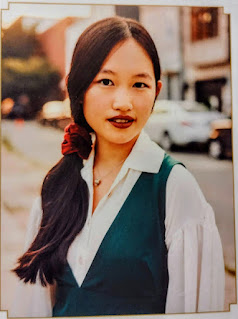By Jacqueline Holland
- Pub Date: 2023
- Genre: Fantasy
- Where I bought this book: Bookmatters, Milford, Ohio
- Why I bought this book: It is a debut novel, and stories of immortality intrigue me
We give immortality to our gods, because they are perfect. We grant immortality to our book characters, because they are not.
Collette LeSange is far from perfect. And she assuredly does not like her immortality. She did not ask for it, and her years on earth -- full of pain and loss, despair, failed hope, and taunts from the gods -- have not been friendly. She isn't living, she thinks, just existing.
And as modern society grows around her, she's finding it harder to hide -- and to eat. Because Collette is a vampire, she must feed on blood, which gets more difficult to find as her years mount up.
Holland's debut novel tells us how Collette gained immortality, her life over the next 150 or so years, and the fears that engulf her and remain constant companions.
It's an audacious tale, full of adventure and sadness. It's a life writ large, and as much as Colette tries, she find it impossible to ignore the larger world. All too often, we find that her attempts to exude compassion and kindness rarely end well.
Collette grew up the daughter of a gravestone carver in the America of the early 19th Century, before her grandfather chose immortality for her -- a sore spot with her. She soon made it to Europe, where she met and was kept by others of her kind. But angry gods and angry mortals decried what they saw as her wickedness, so she was forced to wander alone and live apart from the vremenie -- those who live short lives -- for most of her days.
Now, in the early 1980s, she is living and working in America as the owner of and only teacher at an elite pre-school. She senses the gods -- Czerobog* and Belobog, the former the god of darkness, destruction, and woe; the latter the god of light, life, and good fortune (the pair also may be just two faces of one god) -- have something planned for her.
In successive chapters, Holland alternates between Collette's history and struggles through the years and her current saga, which includes her growing relationship with a young artistic student with a troubled family life.
The book has a few problems: Parts of it are overwritten, both stylistically and in the telling. Over-description is rampant, and some of the storylines could have been parsed or omitted.
But it's a wide-ranging epic, and the ageless protagonist allows Holland to tell a tale over centuries of human history through the eyes of a single women, who is caring and strong, if also confused and lonely. It's overall a good read, depressing at times, but with a texture of hope that threads its way through some of the worst actions of humanity.
___________________________________
*He's also called the God of Endings, hence the title.




